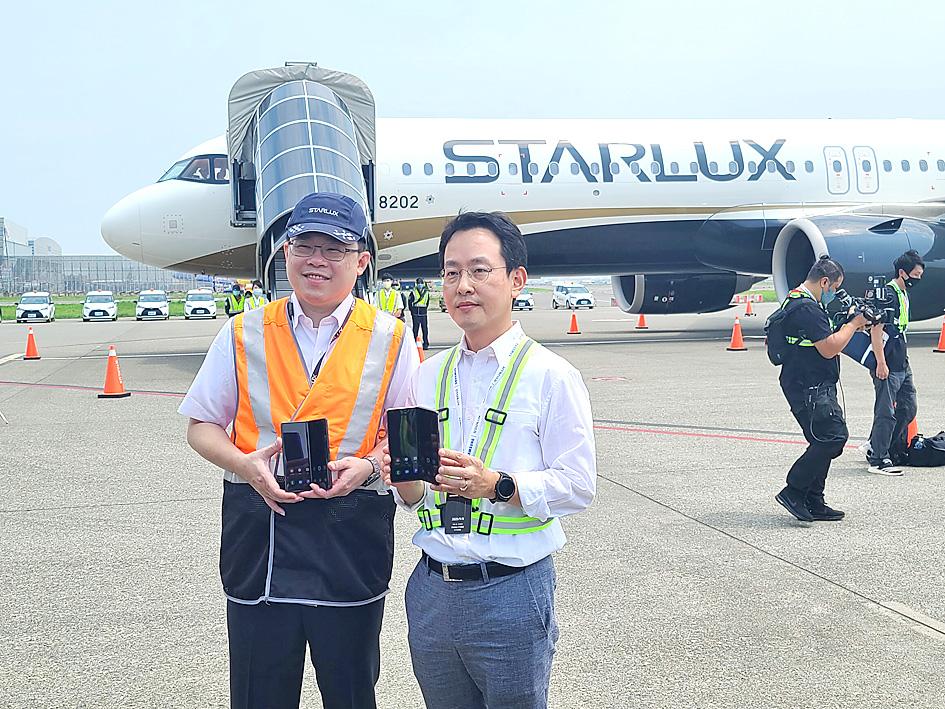Samsung Electronics Taiwan Co (台灣三星電子) yesterday assured Taiwanese customers that there would be sufficient supply of its new flagship folding smartphone to satisfy demand, unlike the limited-run Galaxy Z Fold.
“We have enough supply for the initial wave of demand and we have set a sales target of 10 times the initial run,” Samsung Taiwan vice president Jacob Chen (陳啟蒙) said at the Galaxy Z Fold2 5G news conference at Taiwan Taoyuan International Airport.
With a retail price of NT$71,888 (US$2,436), the new phone is to go on sale tomorrow at select e-commerce and telecom retail outlets, he said.

Photo: CNA
Like its predecessor, the new phone has a cover screen for quick use and opens up to reveal a bigger main screen that supports multi-app usage.
Aside from having an upgraded monitor, camera and hardware, the phone is 5G-enabled and comes with a two-year warranty, the company said.
Loyal VIP customers were treated to a flight to nowhere on a Starlux Airlines Co (星宇航空) flight yesterday, it added.
“It is the most expensive phone and we are taking it up to the sky,” Starlux chairman Chang Kuo-wei (張國煒) said at the event.
A Samsung VIP surnamed Huang (黃) said that as he finds the Galaxy Z Fold convenient and “good enough for now,” he is not considering upgrading to the new model.
Another VIP customer surnamed Hou (侯) said that he would be first in line when the new phone comes out.
“I buy everything Samsung comes out with,” Hou said.

CAUTIOUS RECOVERY: While the manufacturing sector returned to growth amid the US-China trade truce, firms remain wary as uncertainty clouds the outlook, the CIER said The local manufacturing sector returned to expansion last month, as the official purchasing managers’ index (PMI) rose 2.1 points to 51.0, driven by a temporary easing in US-China trade tensions, the Chung-Hua Institution for Economic Research (CIER, 中華經濟研究院) said yesterday. The PMI gauges the health of the manufacturing industry, with readings above 50 indicating expansion and those below 50 signaling contraction. “Firms are not as pessimistic as they were in April, but they remain far from optimistic,” CIER president Lien Hsien-ming (連賢明) said at a news conference. The full impact of US tariff decisions is unlikely to become clear until later this month

Popular vape brands such as Geek Bar might get more expensive in the US — if you can find them at all. Shipments of vapes from China to the US ground to a near halt last month from a year ago, official data showed, hit by US President Donald Trump’s tariffs and a crackdown on unauthorized e-cigarettes in the world’s biggest market for smoking alternatives. That includes Geek Bar, a brand of flavored vapes that is not authorized to sell in the US, but which had been widely available due to porous import controls. One retailer, who asked not to be named, because

CHIP DUTIES: TSMC said it voiced its concerns to Washington about tariffs, telling the US commerce department that it wants ‘fair treatment’ to protect its competitiveness Taiwan Semiconductor Manufacturing Co (TSMC, 台積電) yesterday reiterated robust business prospects for this year as strong artificial intelligence (AI) chip demand from Nvidia Corp and other customers would absorb the impacts of US tariffs. “The impact of tariffs would be indirect, as the custom tax is the importers’ responsibility, not the exporters,” TSMC chairman and chief executive officer C.C. Wei (魏哲家) said at the chipmaker’s annual shareholders’ meeting in Hsinchu City. TSMC’s business could be affected if people become reluctant to buy electronics due to inflated prices, Wei said. In addition, the chipmaker has voiced its concern to the US Department of Commerce

STILL LOADED: Last year’s richest person, Quanta Computer Inc chairman Barry Lam, dropped to second place despite an 8 percent increase in his wealth to US$12.6 billion Staff writer, with CNA Daniel Tsai (蔡明忠) and Richard Tsai (蔡明興), the brothers who run Fubon Group (富邦集團), topped the Forbes list of Taiwan’s 50 richest people this year, released on Wednesday in New York. The magazine said that a stronger New Taiwan dollar pushed the combined wealth of Taiwan’s 50 richest people up 13 percent, from US$174 billion to US$197 billion, with 36 of the people on the list seeing their wealth increase. That came as Taiwan’s economy grew 4.6 percent last year, its fastest pace in three years, driven by the strong performance of the semiconductor industry, the magazine said. The Tsai